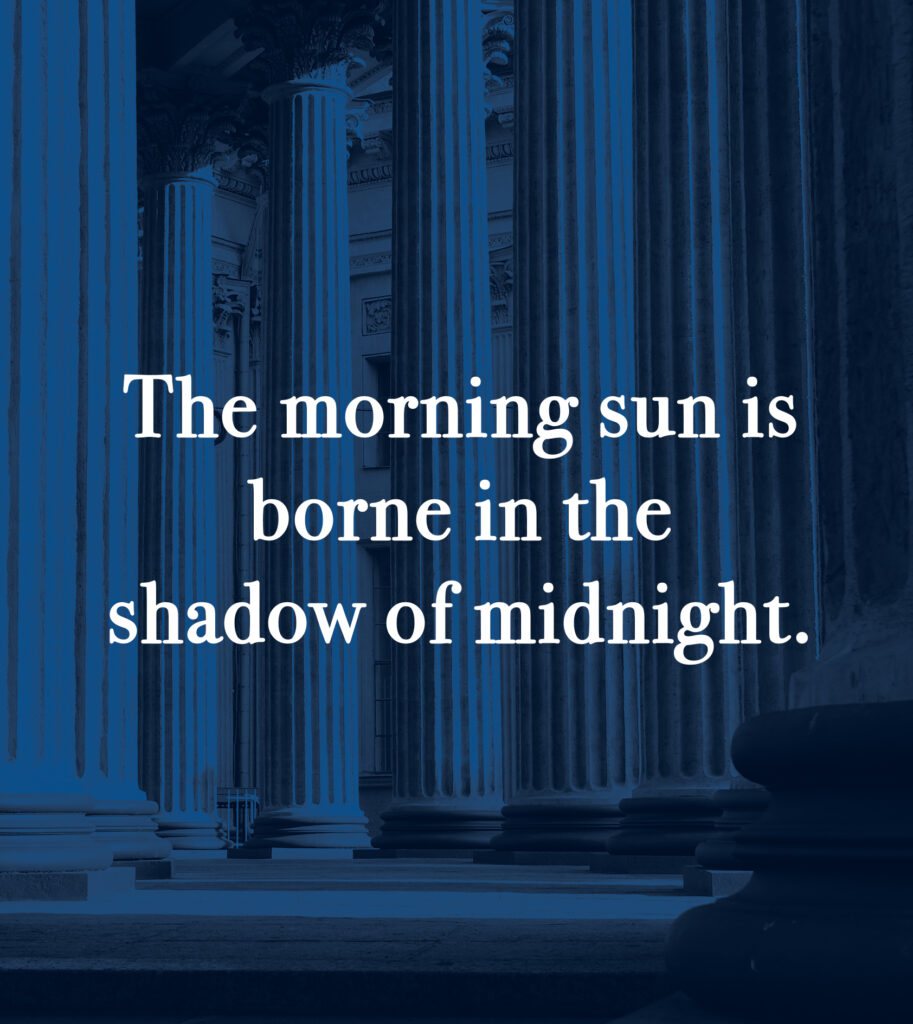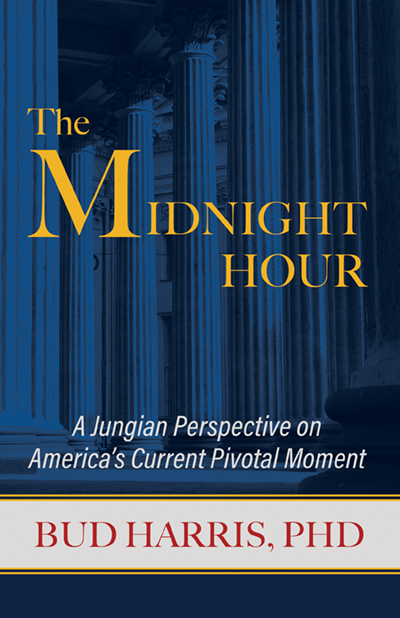 Dear Reader,
Dear Reader,
“Few are guilty but all are responsible,” the great religious scholar and leader Rabbi Abraham Joshua Heschel wrote about the moral state of a people. As a people, we Americans are at a turning point in our history. The core issue challenging us is alienation. Alienation is at the root of decades of increasing violence and misogyny. It is at the root of destruction for destruction’s sake in our politics, too many newscasts, and internet vitriol. And it is at the root of how we have failed to come together to respond effectively to the pandemic, to gun violence, and to climate change. Out of my deep concern and fear, this is the second of six posts which are passages from chapters 12 and 13 in my book The Midnight Hour which I believe can help us reclaim responsibility for the spirit of our country.
Bud Harris
Taking Responsibility for the Reality That Our Democracy is Weak
I have spent four decades thinking of myself as a pretty good citizen. I am law-abiding. I vote, pay my taxes, look after my family, contribute to charities, and care about my community. Now my new awakening is forcing me to ask myself, “How could I have been sleepwalking through the last four decades, minimizing my awareness of the predators and the sliding of my government and my fate into their hands?” I don’t believe I expected myself—or we expected each other—to aspire to the core principles of citizenship, of taking self-responsibility and collective responsibility, of cultivating the inner capacity to know what rings true. In fact, down deep, I knew a lot of the rhetoric and political posturing didn’t ring true. But I tended to brush it off rather than try to step beyond the lies, express my outrage, and take action.
During those four decades, far too many of us deluded ourselves into thinking we were living in a sincere and active democracy ruled by freedom of thought and opinion. But as I have been pursuing these reflections, I have come to know that in my heart I didn’t really believe these assumptions were true and rage was accumulating.
In my own shadow, I was aware that our democracy was weak and becoming weaker. Plus, our democracy was idle because we were idle. Other politically advanced nations have had a much higher percentage of voter turn-out than we have had for most of these forty years. As our democracy has weakened, we have become increasingly ruled by predators and fear. We are afraid of taking risks, of speaking out, of being criticized, of not being politically correct, of being confronted, of offending family, friends, neighbors, and of losing business. Have we become afraid of being free? Freedom requires taking risks, taking stands, and having courage. It requires calling a lie a lie when it is necessary. It requires standing up to people who have become so afraid that they have become despotic in their political positions and are forgetting that the lives of every one of our citizens is sacred. The predators and people who promote the despotic political positions are ignoring the body politic and are attacking the soul of our democracy.
I think that it is clear we are by far the most militarily powerful country on the earth. I don’t fear anything outside of this country, not terrorism, or wild dictators, or floods of immigrants. What I fear most of all is the number of our citizens that are becoming dehumanized and alienated, the weakening of our democracy. I am afraid that if we are not careful, we are condemning ourselves to a civil death while we are distracting ourselves with a fear of outside forces.
I am also afraid of the attack on truth in our media and in politics. I have to state this trend because it scares me so much, and others are writing books about this problem. I am also ashamed that we think we are the land of opportunity. We are not what we think we are. Barbara Ehrenreich points out in Bright-Sided that, “in reality, Americans are less likely to move upward from their class of origin than are Germans, Canadians, Finns, French people, Swedes, Norwegians, or Danes.” This myth of endless opportunity is just about as valid as the one I believed about my home value being resistant to the force of economic gravity. We don’t need to speak truth to power. We need to speak it to ourselves.
* * * *
With a shiver of aversion, I turn off the egotists that dominate so much of our political discourse on the internet, television, and talk radio. They can’t seem to participate in a search for truth or even have a civil discussion that would help inform us on pressing vital topics. They are masters at creating doubt about what is really happening, and which path is actually best for us. But these characters and our responses to their performances illustrate how much we have allowed television, talk radio, and the internet to be our experience of the world. Plus, we relegate too much of our personal responsibility to be informed to these sources, and then make value judgments based on them. On the one hand, they stimulate addictions to fear, fight, and flight reactions. On the other hand, they invite us to sublimate our anger and our intellects into the weeknight and weekend diversions of late-night comedy shows and independent movies.
These venues turn news into entertainment and make it humorous and fun to satirize our mindless and benighted neighbors and our self-aggrandizing politicians. Both approaches help cause a decline in our ability to thoughtfully take the action our anger and frustration should be leading us toward. The result too often is that our hearts atrophy and are shut away from any great enthusiasms except for private ambition, are shut away from any vision based on the faith that we as a people are more than the sum of our material desires. We should ask ourselves, “How will we be remembered? How will history judge us?” It is so easy to look the other way, to look at our busyness or victimhood. It is tempting, even seductive, to look away from the challenges we are facing.
The propaganda from the predators and self-serving politicians also teaches us that it is easier to see our taxes as a burden rather than an investment in the human and material infrastructure that will benefit us all. It is easier to turn a blind eye to the fact the top one percent of households have more wealth than the bottom 90 percent combined, and it is important and infuriating that one political party seems dedicated to reducing taxes for the wealthy. It is pretty obvious that tax relief for the wealthy never trickles down. It goes into high-yield investments. To increase taxes on the rich is simply common sense—it won’t affect their standard of living at all, while increases on the bottom 80 percent significantly affect theirs. I shudder when I think about asking myself if I am better off than I was thirty years ago. But my anger and disgust have distracted me as I have been writing what is bubbling up. All of the rich, as I have carefully pointed out, aren’t predators.
However, I want to return to another danger I see in the media: it can make us feel victorious when in fact the battle has only begun. For
example, the women’s “Me Too” movement is powerful and long overdue. Me Too is terribly important and is having a significant impact. There must never be a time when we fail to have needed protests in our democracy, but we have to be careful not to congratulate ourselves too quickly because of dramatic media attention. In a December 31, 2017, New York Times article, the well-known writer Susan Faludi points out that with all the Me Too publicity going on, the patriarchy hasn’t gone anywhere. In fact, in the midst of this publicity, Congress passed the Tax Cuts and Jobs Act, which in Ms. Faludi’s words “throws a bombshell on women,” young, poor, working class, and older. Passing this law proves further that our democracy is weak. We must all turn our anger into sustained action.
 Go deeper into this and related topics in The Midnight Hour: A Jungian Perspective on America’s Current Pivotal Moment.
Go deeper into this and related topics in The Midnight Hour: A Jungian Perspective on America’s Current Pivotal Moment.
BUY FROM YOUR LOCAL INDEPENDENT BOOKSTORE
Book Excerpts and Resources
, America, anger, anxiety, capitalism, citizenship, Elder Wisdom, fear, hope, Personal Transformation, responsibility, struggles
One Response to “Taking Responsibility for the Reality That Our Democracy is Weak”
Please stay positive in your comments. If your comment is rude it will get deleted. If it is critical please make it constructive. If you are constantly negative or a general ass, troll or baiter you will get banned. The definition of terms is left solely up to us.
Leave a Reply
Thank you for this clear and compelling summary of what’s happening in our democracy today. The fact that we are weakening is a hard and difficult truth, but it must be recognized if we are to move out of our shadows and into the light of integrity and compassion for one another. I agree that we need to speak out against injustice and the corruption that is sapping our strength as individuals and as a nation. Your words are helping me acquire the resolve to take a stand on issues I’m passionate about and share my truths whenever the opportunity arises. Thank you again.